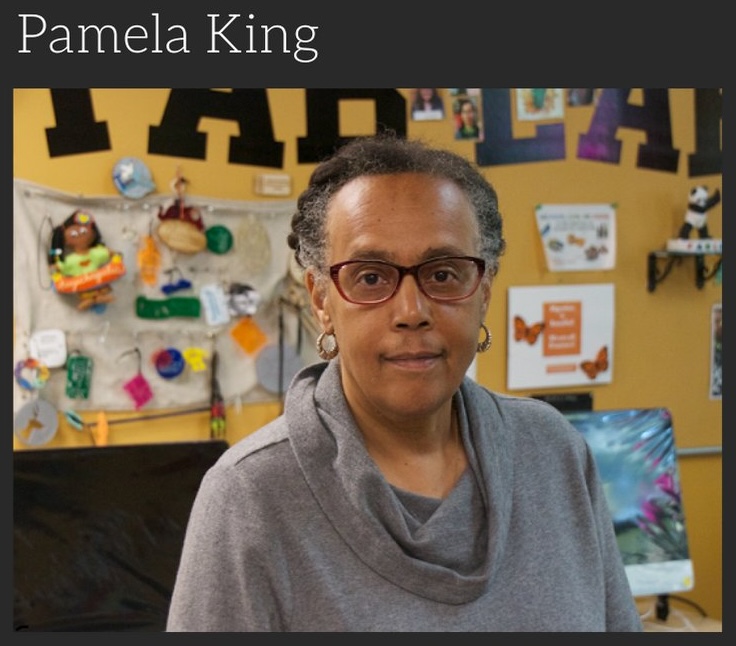In Praise of People Power
Read 5 min

We often speak about the importance of technology in the work that we do, but that should never obscure the simple truth that the Fab Foundation and the entire Fab Lab Network run on people power. We are operated by the people, for the people. And in recognition of that fact, we’re pleased to shine the spotlight on someone who has been an essential part of our community-oriented identity since the very beginning of our journey. Join us in celebrating Pamela King, a pillar of the Fab family and a key player in our mission-driven work to build equitable, inclusive, and sustainable futures for all.

Before the Fab Foundation even existed, Pamela was working alongside Sherry and Neil to help spread the concept of Fab Labs beyond the walls of MIT. They first met in the late ‘90s, when Pamela was involved with community education programs at the South End Technology Center—a Boston institution in which her father’s legacy still looms large. Mel King was a community activist of legend who helped organize residents in Boston’s historic Tent City to push back against the displacement of Black families amid urban renewal in the late ‘60s. Years later, he would establish the South End Technology Center directly across the street from that same housing development to continue serving his community and building opportunity for the underserved. In 2003, this became the site of the first public Fab Lab.
Her father’s reputation certainly casts a long shadow, but Pamela has managed to carve her own path over the years, even as she’s carried forward the family mantle of social justice. “If he was here today, he’d tell you, out of all his kids, I’m the more independent and more rebellious, not afraid to speak my truth,” she says with a smile. “My father never wanted us, his children, to just follow in his footsteps. He wanted us to be independent thinkers and do what made us happy. That’s not to say that we didn’t learn a lot from him.” So, in addition to teaching computing classes at the South End Technology Center, leading workshops on digital embroidery in their Fab Lab, and helping to coordinate other programs, she struck off on her own, finding unique ways to put her talents to work in service of the Black community and other under-resourced populations—all the while developing a suite of administrative skills that she would bring to bear on future work.
Pamela officially joined the Fab Foundation in 2013, during its infancy, and enjoyed the distinction of becoming employee #1. “I did a bit of everything, from ordering Fab Lab equipment to assisting with fiscal operations,” she reflects on those early days. “Around that time, Chevron had awarded a $10 million contract to build several labs in their catchment area throughout the US. So, we helped build labs all across the country. Of course, we were also building labs in other countries around the globe, bringing more people into the Fab Lab Network, bringing everybody together and sharing these tools.”
It’s fair to say that Pamela was instrumental in helping us find our footing in the beginning, setting the Fab Foundation on a positive trajectory. She actively supported the growth of our community and the impact of our work on a global scale. Yet, it’s perhaps her involvement with under-resourced populations in the Boston area—including cultural programming, youth education, workforce development, women’s health research, skills training for the formerly incarcerated, community organizing during the COVID-19 pandemic, and providing a safe space for local residents—that best speaks to the quality of her character and her concern for humanity. Through years of selfless dedication, Pamela has made an indelible imprint upon the world. However, she remains humble regarding her influence. “I’ve never really thought too much about the mark I’m leaving,” she confesses. “I just hope that, whatever I’ve been able to offer to people, it’s been helpful for them to move to wherever they want to be.”
But it would be a mistake to interpret that humility as a reluctance to keep fighting for what’s right. “I’ve always been in the community,” she reminds us. “I have to do something to be active and to be involved.” And, reflecting on the political and social tensions of the moment—in which dramatic changes threaten to unravel years of social progress on many fronts—she adds a much-needed dose of positivity to the broad conversation. “This is just another tide that we have to ride. But we’re resilient. If we let negativity into our lives, then we’re not going to get anywhere; it just eats at your soul. I’ve got to keep positive. As Jesse Jackson said, ‘Keep hope alive.’ I won’t allow whatever’s coming down the pike to stop me. We can’t fall down. We’ve just got to keep moving forward in what we’re doing and help others along the way if we can. You support each other, lean on each other, and life will be fine.”
It’s a good reminder that the struggle for a more just and equitable world reaches way back into history and must be approached every day with renewed vigor. As we celebrate Black History Month and consider the work still to be done to effectively remove barriers to opportunity for marginalized communities everywhere, we want to express our profound gratitude to Pamela, her brother Michael—who now runs the South End Technology Center and will soon be partnering with us on an exciting youth education initiative—and, of course, their late father for their many contributions to the Fab Lab Network, the Greater Boston community, and people in need all around the world.